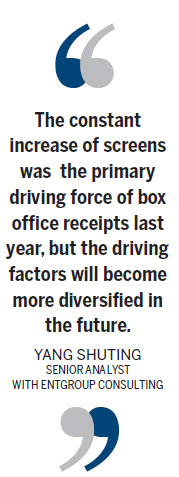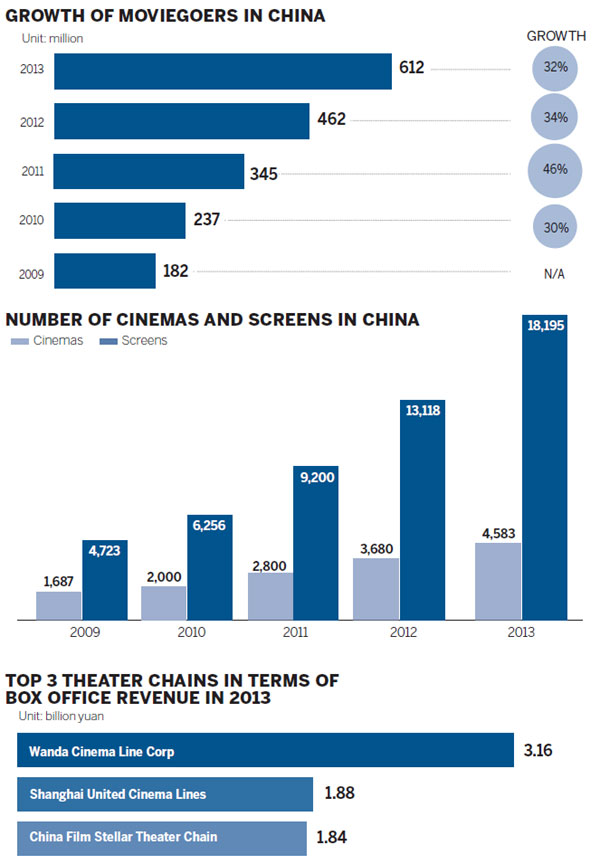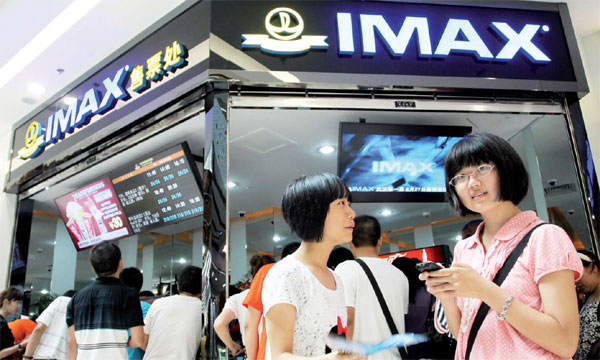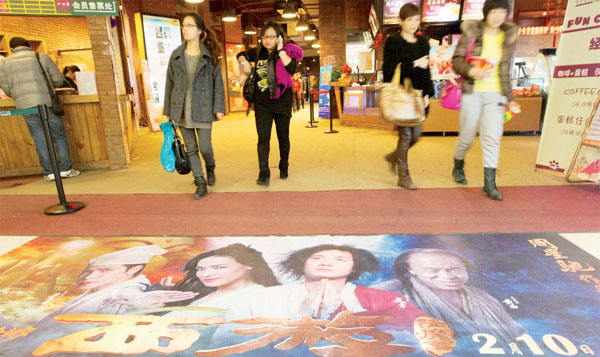China's silver screens look for more luster

| Wanda Cinema in Wuhan, Hubei province. Wanda Cinema Line earned 3.16 billion yuan last year and topped box office revenues in the country. Provided to China Daily |
Local producers performing well but can't afford to rest on laurels
Large audience numbers at cinemas in both large and small cities show moviegoing is a popular pastime for people in China, now the world's second-largest film market.
Box office revenue hit 21.77 billion yuan ($3.6 billion, 2.5 billion euros) in 2013, up 27.51 percent year-on-year, according to statistics from the State Administration of Press, Publication, Radio, Film and Television, the government watchdog for the film and TV series industry.
But the rosy figures cannot cover some potential problems that come with the development of the country's movie industry.
The continued expansion of movie theaters serves as a major engine for ticket sales growth alongside increased moviegoing.
Last year, 5,077 screens were added in China, pushing the total to 18,195 at the end of 2013, according to the state administration.
The number of moviegoers grew by 32 percent, from 462 million in 2012 to 612 million in 2013, according to EntGroup Consulting, a Beijing-based entertainment industry consulting firm.

"The constant increase of screens was the primary driving force of box office receipts last year, but the driving factors will become more diversified in the future, including better-quality movie productions, and more professional marketing strategies and promotional methods," says Yang Shuting, a senior analyst with EntGroup Consulting.
The top three private film companies took almost half of the domestic film market share last year, according to statistics from the State Office of Government Fund of National Film Development.
Of the 21.77 billion yuan box office take, 12.77 billion yuan was generated by domestic productions, representing a year-on-year growth of 54.32 percent, up from 48 percent in 2012, according to official statistics.
Huayi Brothers Media Group earned 3 billion yuan in box office revenue last year, up 39 percent year-on-year. It accounted for 25 percent of the country's movie market, followed by Beijing Enlight Media Co Ltd, with 2.3 billion yuan, and Le Vision Pictures (Beijing) Co Ltd, with 1 billion yuan in ticket sales.
"The distribution of a couple of movies that were extremely successful in ticket sales was critical for the business performance of the top three private film studios last year," says Peng Kan, research and development director of the Beijing-based consultancy company Legend Media.
Journey to the West: Conquering the Demons, the highest-grossing film of the year, was distributed by Huayi Brothers and took in 1.25 billion yuan at the box office. Another two productions that made it onto the top 10 highest-grossing films list were produced and distributed by the company - Young Detective Dee: Rise of the Sea Dragon and Personal Tailor.
Enlight Media had success with So Young and American Dreams in China, while Le Vision Pictures earned fame with its Tiny Times series.
"Producer's dependence on blockbusters became stronger than in the previous year, and medium-budget productions fell in numbers compared to 2012, which is not healthy for the companies themselves or the industry," Peng says.
Medium-budget productions are usually genre films and, in Hollywood, an individual studio produces 16 to 20 such films every year, a scale that brings stable profits, Peng says.
In contrast, high-budget films come with high risk and take up too much of the capital and resources of a studio, making it more susceptible to market uncertainty and less capable of fostering new talent or developing new subjects for films, according to Peng.
Moreover, for emerging studios like Le Vision Pictures, which was established in 2011 and made it to third place on the list last year, its advantages haven't been fully exploited due to the studios' lack of quality content.
Le Vision Pictures has an edge over its rivals in its distribution channels and management over its rivals, but its inadequate supply of films that enjoy widespread popularity has reduced its total box office revenue.
Tiny Times 1.0 and 2.0 contributed as much as 800 million yuan in ticket sales, 80 percent of the company's total box office revenue.

No matter how effective and well-developed a studio's distribution system is, without good content, it is hard for it to yield practical benefits, Peng says.
Profit-generating model
Another potential problem for the market is a contradiction between declining profits per screen and the increase of screen numbers.
Despite the large increase in theater screens every year, the annual average yield per screen has been in decline since 2010, when China's box office exceeded 10 billion yuan for the first time, says Wei Pengju, dean of the Culture Economics Institute at the Central University of Finance and Economics.
This can be attributed, to some extent, to the falling annual growth rate of moviegoers, a shortage of quality domestic movies and the government's cut in film imports.
The number of moviegoers surged 46 percent year-on-year to 345 million in 2011, but only witnessed a growth rate of 34 percent in 2012, followed by a 32 percent increase last year, according to statistics from EntGroup Consulting.
The government reduced the number of imported movies from 75 in 2012 to 57 last year to protect domestic productions, Peng says.
He said for film companies that have gone public, branching out into other film-related sectors might be a good solution for allaying the high risks of the industry.
In 2013, Huayi Brothers purchased a 20 percent stake in a theater management corporation for 210 million yuan, which was followed by the acquisition of a 51 percent stake in Zhejiang Yongle Film and TV Co for about 400 million yuan.
Beijing Enlight Media plans to buy a 27.6 percent stake of a film and TV series company - New Classics Media Company - for 829 million yuan, it announced in October.
Analysts say these investments can be interpreted as the film studios' efforts to shore up their TV series businesses as well as to balance the financial risks involved in film production.
In the first three quarters of 2013, Huayi Brothers, for example, reported a 35.38 percent decline in its TV series arm year-on-year, earning only 142 million yuan.
The fall in TV drama revenue also pushed the company to post a lower total revenue growth of 13.92 percent during the same period, in comparison with 31.17 percent a year earlier.
"In the long run, these investment decisions to strengthen the TV series business will create benefits for the companies because they can develop the TV series content into film adaptations or vice versa without paying extra copyright fees," says Peng, adding that, so far, this benefit-generating model hasn't been fully implemented by Chinese companies.
Interestingly, some small-budget productions replaced big-budget films in raking in large ticket sales last year.
Finding Mr. Right, a romance comedy released in March last year, earned 519 million yuan in box office revenue for a total investment of less than 30 million yuan. Actress-turned director Zhao Wei's debut So Young earned 717.8 million yuan in ticket sales, ranking third in China's highest-grossing list of 2013, while costing only 60 million yuan to produce.
"The unexpected success of small-budget movies is a transitional phenomenon in the Chinese movie industry's evolution, and won't last long," Wei at the Central University of Finance and Economics says.
"I think the general and everlasting principle of the movie market is big-budget productions producing big returns, and this is also the trend toward which China's movie industry is moving," Wei says.
"Only then can China's movie market be judged as mature," he says.
huangying@chinadaily.com.cn
| The playbill of Journey to the West: Conquering the Demons in a cinema. The film, distributed by Huayi Brothers, is the highest-grossing film of last year. Provided to China Daily |

(China Daily European Weekly 05/09/2014 page14)
Today's Top News
- Takaichi must stop rubbing salt in wounds, retract Taiwan remarks
- Millions vie for civil service jobs
- Chinese landmark trade corridor handles over 5m TEUs
- China holds first national civil service exam since raising eligibility age cap
- Xi's article on CPC self-reform to be published
- Xi stresses improving long-term mechanisms for cyberspace governance
































